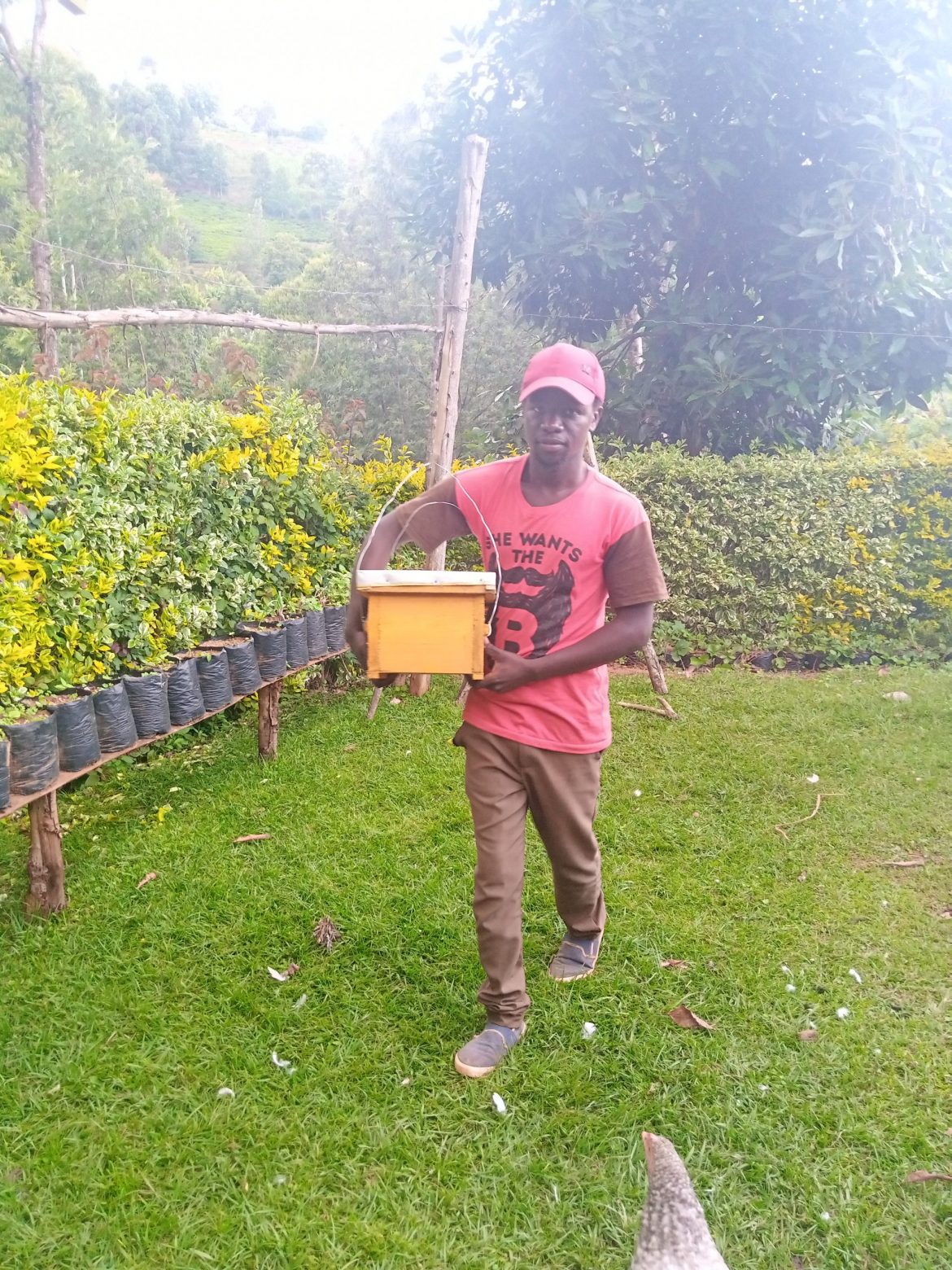
By Mugendi Kangichu
Morris Mugambi Njeru calls a bodaboda operator a few minutes after 7 pm. The rider assures him he would be around in the next few minutes and Mugambi reverts to his previous activity—plugging holes on a small stocked beehive.
He ensures all holes are blocked and no insect can get out. A few minutes later, the Bodaboda operator arrives and without wasting time, we ride on the bike and travels barely three kilometers away.
“We have now arrived. Please, wait for me here. I will be back shortly,” says Mugambi who hails from Kirimiri village of Runyenjes Constituency, Embu County. Though left in stitches, we later learned he moved towards his customer’s apiary to stock bees.
This is what the 24-year-old man has been doing for the last two years. He says, “I started keeping bees in 2011 when I was 15-years-old. My father was abandoning his beekeeping project and I requested him to hand it over to me and he did it.”
He says he could not go with us to the apiary as bees would turn wild and attack us. “When working with bees, you need to wear protective gear,” he advises revealing that he transport bees during the evening hours.
He says his initial aim of venturing into beekeeping was to produce honey for sale but later learned that there were many challenges faced by bee farmers.
“At times, hives fail to attract bees and this is one of the major challenges faced by local beekeepers. I decided to offer a solution to this challenge. I divide huge colonies and sell bees to farmers,” he reveals.
Mugambi is a graduate with a Diploma in general agriculture and says that colony sub-division requires an expert.
Since he was young, he says, he loved farming and agriculture in general and that is why he opted to pursue a course in agriculture.
He says the activities involved require an expert who should understand when the colony is fit for subdivision and how to do it without causing migration of the swarms.
Mugambi has constructed catch boxes with each having four frames of the same size with the ones in the normal beehives.
He says a catch box has four frames which he interchanges with other packed frames from the hive he wishes to subdivide the colony.
“I am able to tell when a colony is ready for subdivision. From the packed hive—where I want to subdivide colony—I remove four frames.
One is packed with broods, another one with pollen, the third one with honey and the fourth one packed with filled with a comb which he replaces with the frames from the catch box,” he reveals.
After that, he places the catch box in a reasonable distance from the hive he wants to subdivide and in a matter of utmost two weeks; Mugambi says the catch box will have attracted bees which he sells at Sh2, 500 to farmers.
“The activities involved require one to understand the size of the frames in the normal hives. Trapping and stocking bees for farmers is not a simple affair and that is why I charge Sh2, 500,” he tells us adding that he also makes modern beehives which he sells at Sh5, 500 each.
Mugambi reveals that he has been subdividing colonies for over four years now and farmers who have benefitted from this activity have applauded his efforts to see many practice bee-keeping.
Martin Njeru, a beekeeper in Mukuuri village of Runyenjes constituency says his hives remained for about two months without attracting any bee but with the help of Mugambi, he is now a happy farmer harvesting over 15 kilos of honey from a single hive per year.
He reveals that when it’s time to transport the insects, he ensures the entrances to the catch boxes are completely blocked to ensure no bee comes out of the hive.
Mugambi who practices bee farming in his father’s land has no definite type of the hives that he stocks. He stocks all the types. He seeks to start training farmers on beekeeping, different hives, and characteristics of bees among other things.
The money he has been getting from his beekeeping venture has helped him pay part of his school’s fees as well as improving his living standards. He has also been able to assist his parents to completely foot for some of his bills.
Comments (2)
-
Good work Morris keep inspiring more youths… Ukulima sio ushamba.
-
Cogratulations Morris Mugambi Njeru .You are doing good job .




